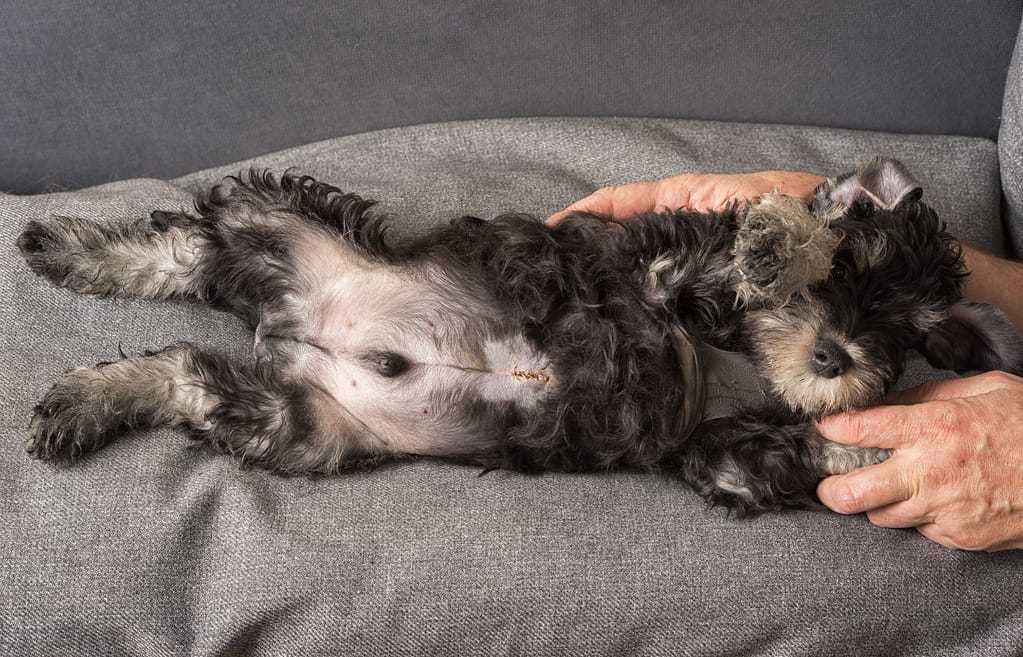
An umbilical hernia is a common condition seen in puppies, where a small opening in the abdominal wall allows the contents of the abdomen to protrude. While not inherently dangerous, umbilical hernias can lead to complications if left untreated. As a buyer, you may be wondering if should I buy a puppy with an umbilical hernia? Here is a comprehensive guide to help you make an informed decision.
Table of Contents
How Serious is an Umbilical Hernia in a Puppy?
- An umbilical hernia produces a soft, reducible swelling just under the skin near the puppy’s belly button. It contains fat or small intestine pushing through an opening in the abdomen.
- Most umbilical hernias in puppies are small, painless, and pose little health risk. Up to 25% of dogs have an umbilical hernia at birth that spontaneously resolves by adulthood.
- Larger hernias have a higher risk of complications like inflammation, infection, or strangulation of the intestine. These require surgical repair.
- Veterinarians can determine the severity through physical exam and imaging tests if needed. Mild hernias may only need periodic monitoring.
Can You Leave an Umbilical Hernia Untreated in Dogs?
- While small hernias often close on their own, repairing them surgically before adulthood is generally recommended.
- Leaving umbilical hernias untreated runs the risk of complications developing later in life. Strangulation of intestinal loops through the hernia leads to blocked blood supply, infection, and even death.
- Surgery in adult dogs is more complicated than early repair in puppies. It may involve hernia mesh placement and carries higher risks.
- Even if the hernia remains painless and doesn’t enlarge, surgical repair is advised for prevention and peace of mind.
What Happens If You Ignore an Umbilical Hernia?
Ignoring an umbilical hernia and leaving it untreated could potentially lead to the following complications:
- Enlargement of the hernia over time as abdominal contents push through.
- Incarceration – intestines or other organs get stuck in the hernia, unable to be pushed back in. This causes severe pain, vomiting, or lethargy.
- Strangulation – trapped intestine has blood supply cut off. This is a life-threatening emergency requiring immediate surgery.
- Skin irritation and infection around the enlarged swelling.
- Hernia recurrence after manual reduction due to persistent defect in the abdominal wall.
- Greater risks and costs of repair surgery later in the dog’s life.
- Limitations on the dog’s activity and quality of life to prevent hernia enlargement.

Can a Dog Live a Full Life with a Hernia?
- Dogs can live full lives with umbilical hernias if the condition is monitored and does not cause discomfort or complications.
- Small, reducible hernias that stay the same size rarely impact daily activities or health. But trouble often develops later, so early repair is best.
- With surgery before adulthood, the long-term prognosis is excellent and dogs have normal life expectancies.
- Even large hernias can be surgically repaired, but dogs require restricted exercise during recovery. Recurrence risks also increase.
- Lifestyle adjustments like preventing obesity, switching to low-impact exercise, and avoiding rough play facilitate managing unrepaired hernias.
- Overall quality of life is compromised when dogs cannot be as active. Untreated hernias also carry risks of serious complications.
FAQs
How can I tell if my puppy’s umbilical hernia is serious?
Look for a large, firm swelling that does not reduce, causes pain, leaks fluid, or shows signs of redness/infection. These require urgent vet evaluation to determine optimal treatment. Mild hernias are small, soft, and painless.
Will umbilical hernias go away on their own?
Small hernias may close spontaneously by 6-12 months of age. But it’s generally recommended to repair them surgically by 5-6 months old before the abdominal wall completely seals. Leaving them be runs the risk of future complications.
Does umbilical hernia repair surgery require hospitalization?
Umbilical hernia repair is often done as an outpatient procedure, with puppies going home the same day. Larger hernias or complications may warrant hospitalization for closer monitoring. Follow all post-op instructions carefully.
Can umbilical hernias come back after surgery?
Yes, there’s a chance of recurrence if the abdominal wall does not heal properly. Strict rest post-surgery minimizes risks. Obesity and strenuous activity can predispose to recurrence. Mesh implants help reinforce repairs.
How much does umbilical hernia repair surgery cost?
Costs average $300-$800 but vary based on hernia size, hospital fees, medications needed, and vet charges. Larger hernias and mesh implantation are more expensive. Insurance or payment plans can assist with affordability.
Is umbilical hernia repair safe in young puppies?
Yes, surgery is very safe and effective when performed by an experienced veterinarian. The ideal timing is around 4-6 months old. Repair at this age has quick recovery, low recurrence risks, and avoids complications later in life.
Conclusion
While umbilical hernias are common in puppies, it is best not to ignore them given the risks of serious complications developing later in life. Surgical repair by 5-6 months of age is generally recommended after vet evaluation for optimal health and quality of life. So if you wondering should I buy a puppy with an Umbilical Hernia? The answer is yes! Dogs can live completely full lives following recovery if monitored closely and repaired early. Consider both medical and financial factors carefully when deciding whether to buy a puppy with an umbilical hernia.








Leave a Reply
You must be logged in to post a comment.